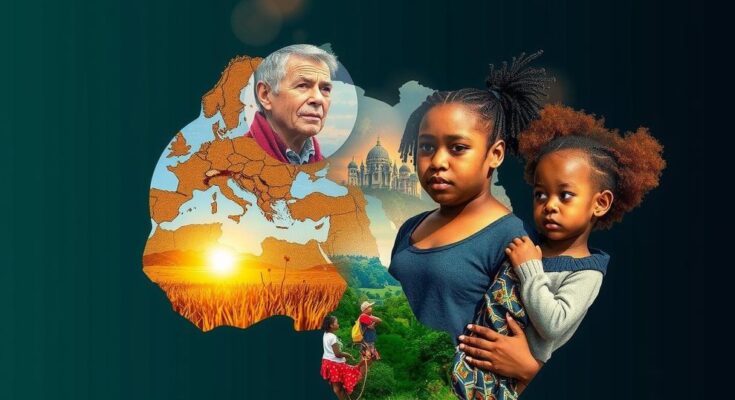Children in sub-Saharan Africa are among the most vulnerable to climate change impacts but receive minimal funding for climate resilience. A UNICEF report warns that extreme weather conditions will increasingly affect them, with 48 out of 49 assessed African nations categorized as high risk. UNICEF demands greater action and commitment from global leaders to protect children’s futures.
Children in sub-Saharan Africa face heightened risks from the increasingly severe impacts of climate change, yet they remain largely overlooked when it comes to climate financing. Reports indicate that inadequate access to climate-resilient infrastructures like safe shelters, healthcare, clean water, cooling systems, and educational opportunities exacerbate their vulnerability. Furthermore, the digital divide restricts their access to essential skills, which adversely affects their future educational and employment prospects.
According to UNICEF’s recent report “The State of the World’s Children 2024: The Future of Childhood in a Changing World,” the climate crisis is anticipated to subject children in sub-Saharan Africa to heightened exposure to extreme weather events, including severe heat and flooding, as we approach the 2050s. Alarmingly, 48 of the 49 countries analyzed in the study categorize children as being at high or extremely high risk from climate change impacts. UNICEF highlights the urgent need for increased funding, noting that less than three percent of global climate funding is allocated to addressing children’s needs. “The projections in this report demonstrate that the decisions world leaders make, or fail to make today will define the world children will inherit,” stated Catherine Russell, the executive director of UNICEF.
At the recent COP29 climate conference held in Baku, Azerbaijan, UNICEF revealed the concerning statistic that over 40 million children in Africa and parts of Asia were unable to attend school this year due to extreme heat. The organization urged that COP29 must prioritize actionable commitments for children, emphasizing that currently, fewer than half of the nationally determined contributions include provisions specifically addressing children’s needs, despite their disproportionate vulnerability to climate change.
In a significant gesture on World Children’s Day in Zimbabwe, children from seven southern African nations united to call for reforms in the education system, advocating for an educational framework that is relevant and effective in the context of today’s rapidly changing world.
The article discusses the effects of climate change on children in sub-Saharan Africa, highlighting their vulnerability due to inadequate infrastructure and access to vital resources like education and healthcare. The UNICEF report provides alarming predictions about the impacts of extreme weather on future generations, emphasizing that the issues faced by children are not being adequately addressed in global climate funding. The call for immediate action from both children’s advocates and global leaders is pivotal to safeguard their futures against worsening climate conditions.
The analysis reveals a critical oversight in climate funding, with children in sub-Saharan Africa bearing the brunt of climate change effects despite minimal financial support directed towards helping them. It is imperative that global leaders take decisive action to protect the rights and futures of these vulnerable populations. The alarming data from UNICEF underscores the urgent need for comprehensive strategies that directly benefit children and address their unique challenges in the face of climate adversity.
Original Source: global.chinadaily.com.cn




